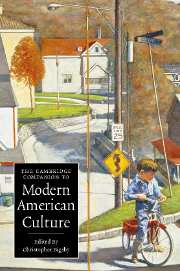Book contents
- Frontmatter
- 1 Introduction: What, then, is the American?
- 2 The American century
- 3 The regions and regionalism
- 4 Immigration to the United States in the twentieth century
- 5 Religion in the United States in the twentieth century: 1900-1960
- 6 Shifting boundaries: religion and the United States: 1960 to the present
- 7 The Hispanic background of the United States
- 8 African Americans since 1900
- 9 Asian Americans
- 10 Women in the twentieth century
- 11 Queer America
- 12 The United States, war, and the twentieth century
- 13 The culture of the Cold War
- 14 Secret America: the CIA and American culture
- 15 Vietnam and the 1960s
- 16 New York City and the struggle of the modern
- 17 Music: sound: technology
- 18 African American music of the twentieth century
- 19 Hollywood cinema
- 20 Popular culture
- 21 Theatre
- 22 Society and the novel in twentieth-century America
- 23 “Preferring the wrong way”: mapping the ethical diversity of US twentieth-century poetry
- Index
- Series List
11 - Queer America
Published online by Cambridge University Press: 28 January 2007
- Frontmatter
- 1 Introduction: What, then, is the American?
- 2 The American century
- 3 The regions and regionalism
- 4 Immigration to the United States in the twentieth century
- 5 Religion in the United States in the twentieth century: 1900-1960
- 6 Shifting boundaries: religion and the United States: 1960 to the present
- 7 The Hispanic background of the United States
- 8 African Americans since 1900
- 9 Asian Americans
- 10 Women in the twentieth century
- 11 Queer America
- 12 The United States, war, and the twentieth century
- 13 The culture of the Cold War
- 14 Secret America: the CIA and American culture
- 15 Vietnam and the 1960s
- 16 New York City and the struggle of the modern
- 17 Music: sound: technology
- 18 African American music of the twentieth century
- 19 Hollywood cinema
- 20 Popular culture
- 21 Theatre
- 22 Society and the novel in twentieth-century America
- 23 “Preferring the wrong way”: mapping the ethical diversity of US twentieth-century poetry
- Index
- Series List
Summary
In A Queer Mother for the Nation (2002), Licia Fiol-Matta looks critically at the political and literary career of Chilean Nobel laureate Gabriela Mistral. Fiol-Matta analyzes, in particular, the “queer” aspects of Mistral's life: a series of affairs with women, a non-normative gender presentation perhaps best described as “female masculinity,” and a spectacularly nonreproductive maternal identity. Mistral's career as internationally renowned educator and poet depended upon her paradoxically maternal but celibate role as “Schoolteacher of America.” Fiol-Matta's study considers how these non-normative features of Mistral's life were deployed to abet state-sanctioned heteronormativity, patriarchy, and a racialized nationalism. Dominant understandings of gender, sexuality, race, and nation were consolidated - in Chile and across Latin America - not in spite of but through Mistral's demonstrable queerness.
From the perspective of the late 1980s, perhaps, one could make the case that in the United States, such a queer consolidation of dominant discourses was unthinkable. Queerness, in the United States, seemed at the time to mark the very limits of citizenship. Largely in response to the HIV/AIDS crisis, new forms of public dissent and civil disobedience had emerged, increasingly understood as “queer activism.” In the academy, likewise, new forms of critical analysis developed, called – from the early 1990s on – “queer theory” or “queer studies.”
- Type
- Chapter
- Information
- The Cambridge Companion to Modern American Culture , pp. 215 - 234Publisher: Cambridge University PressPrint publication year: 2006



